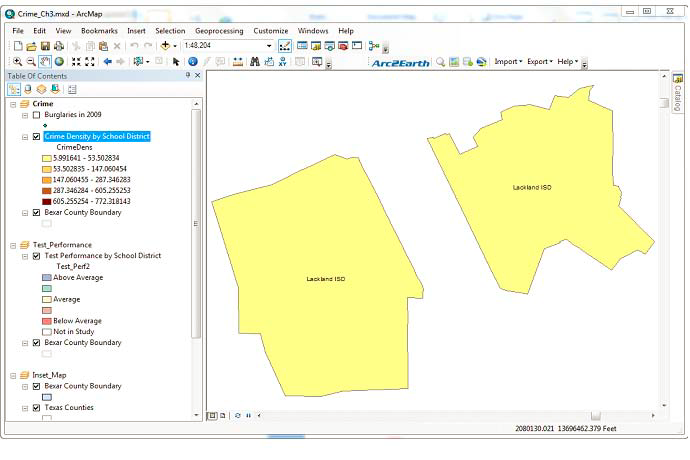深入理解游标Cursors,实现数据的快速查找,插入,删除,更新(转)
深入理解游标Cursors,实现数据的快速查找,插入,删除,更新
1、 查找数据Search Cursors //by yl landgis@126.com yanleigis@21cn.com 2008.7.7
[C#]
//Create an envelope for the lower right portion of data
IEnvelope envelope = new EnvelopeClass();
envelope.PutCoords(508786, 681196, 513033, 684341);
// create a spatial query filter
ISpatialFilter spatialFilter = new SpatialFilterClass();
// specify the geometry to query with
spatialFilter.Geometry = envelope;
// specify what the geometry field is called on the Feature Class that we will querying against
String shpFld = featureClass.ShapeFieldName;
spatialFilter.GeometryField = shpFld;
// specify the type of spatial operation to use
spatialFilter.SpatialRel = esriSpatialRelEnum.esriSpatialRelIntersects;
// perform the query and use a cursor to hold the results
IQueryFilter queryFilter = new QueryFilterClass();
queryFilter = (IQueryFilter)spatialFilter;
IFeatureCursor searchCursor = featureClass.Search(queryFilter, true);//只查询,true快一些
IFeature feature = searchCursor.NextFeature();
int n = 0;
while (feature != null)
{
n++;
feature = baseCursor.NextFeature();
}
2、 插入数据Insert Cursors—目前数据插入最快的方法 //by yl landgis@126.com yanleigis@21cn.com 2008.7.7
//Create the Feature BufferIFeatureBuffer featureBuffer = featureClass.CreateFeatureBuffer();
//Create insert feature cursor using buffering = true.IFeatureCursor featureCursor = featureClass.Insert(true);
object featureOID;
//All of the features to be created were installed by "B Pierce"featureBuffer.set_Value(featureBuffer.Fields.FindField("InstBy"), "B Pierce");
for(intic = 0; ic < 99; ic++)
{
//Set the featurebuffers's shape
featureBuffer.Shape = geometry
//Insert the feature into the feature cursor
featureOID = featureCursor.InsertFeature(featureBuffer);
}
//All of the features to be created were installed by "K Johnston"featureBuffer.set_Value(featureBuffer.Fields.FindField("InstBy"), "K Johnston");
for(intic = 0; ic < 99; ic++)
{
//Set the feature's shape
featureBuffer.Shape = geometry
//Insert the feature into the feature cursor
featureOID = featureCursor.InsertFeature(featureBuffer);
}
featureCursor.Flush();
3、 数据删除 delete //by yl landgis@126.com yanleigis@21cn.com 2008.7.7
IFeatureClass featureClass = featureWorkspace.OpenFeatureClass(“Parcels”);
IQueryFilter queryFilter = new QueryFilterClass();
queryFilter.WhereClause = “ZONING_S = ‘R'”;
// use IFeatureClass::Update to populate IFeatureCursor
IFeatureCursor updateCursor = featureClass.Update(queryFilter, false);
IFeature feature = updateCursor.NextFeature();
int m = 0;
while (feature != null)
{
m++;
updateCursor.DeleteFeature(feature);
feature = updateCursor.NextFeature();
}
4、 数据更新 update //by yl landgis@126.com yanleigis@21cn.com 2008.7.7
IFeatureClass featureClass = featureWorkspace.OpenFeatureClass(“Parcels”);
// restrict the number of features to be updated.
IQueryFilter queryFilter = new QueryFilterClass();
queryFilter.WhereClause = “ZONING_S = ‘U'”;
// use IFeatureClass::Update to populate IFeatureCursor
IFeatureCursor updateCursor = featureClass.Update(queryFilter, false);
int fieldindex = featureClass.FindField(“ZONING_S”);
IFeature feature = updateCursor.NextFeature();
int m = 0;
while (feature != null)
{
m++;
feature.set_Value(fieldindex, “X”);
updateCursor.UpdateFeature(feature);
feature = updateCursor.NextFeature();
}
转载自:https://blog.csdn.net/shuchengzhang/article/details/4332113




